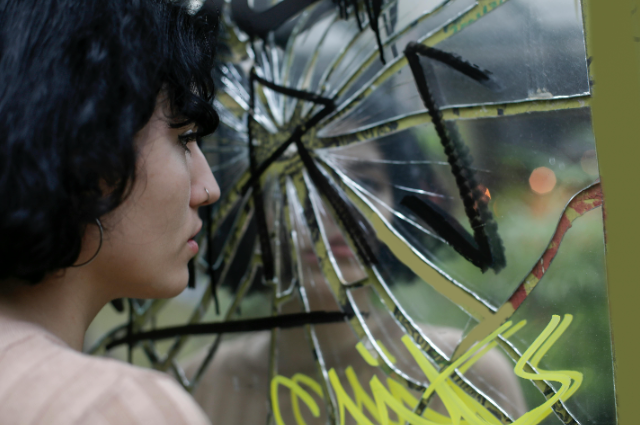
Earlier, we were told that self-awareness is a power. Understanding your emotions, patterns, and thoughts would make you stronger, calmer, and wiser. But something really strange happened along the way. We didn’t just become aware, we became hyper-aware. Every word we say, every move we make, every emotion we feel, we now observe it like an outsider watching a movie of our own life. Instead of living, we’re constantly monitoring ourselves.
It’s like having a camera pointed at your face all the time, even when you’re alone. You’re not just eating, you’re noticing how you eat. You’re not just laughing, you’re analyzing how your laugh sounds. You’re not just in love, you’re wondering whether your love looks “healthy” or “toxic.” This is the curse of hyper-self-awareness and of knowing too much about yourself. It's now a mind that can’t stop watching itself.
The Mirror That Never Turns Off
Social media literally made self-awareness a full-time job. We now live with a digital mirror that reflects every version of us. Which is either filtered, captioned, or judged. Even when we’re not online, we act as if we’re being watched. We’ve become characters performing in the theater of our own minds.
Every conversation becomes a mental replay. Every photo becomes an internal debate. Like “Do I look confident or awkward? Am I trying too hard?” We live in a feedback loop of self-critique. Instead of enjoying the moment, we’re thinking about how the moment looks from the outside.
The result? Exhaustion. Anxiety. Emotional paralysis. We don’t know how to just be anymore. We only know how to seem.
When Reflection Turns Into Obsession
Self-awareness is supposed to help you grow. But too much of it becomes self-surveillance. It’s like watering a plant until it drowns. You keep reflecting on your every emotion until you start doubting its authenticity. “Am I actually sad, or am I just overthinking again?” “Am I happy, or am I pretending to be?”
This kind of constant analysis kills spontaneity. You stop dancing because you’re too busy watching how you move. You stop speaking freely because you’re afraid of saying something “wrong.” You start censoring your emotions, and editing your personality, and you doubt your every instinct. All in the name of being “self-aware.”
But the irony is, the more you try to “understand yourself,” the further you drift from your real self.
The Fear of Being Cringe
The word “cringe” has quietly become the new social control for us. We mock people for being too expressive, too emotional, too unfiltered. And so we all start shrinking ourselves to avoid that embarrassment. We don’t post that poem because it’s “too deep.” We don’t share that opinion because it might be “too much.”
We’ve replaced living boldly with living safely. We hide our genuine feelings behind sarcasm and irony. Being real has become uncomfortable. Vulnerability feels like a threat. So, we wear not just masks, but layers of coolness, detachment, and control. All to avoid being seen as “cringe.”
But in trying to protect ourselves from embarrassment, we’ve accidentally killed our freedom.
Living Inside the Mind
Have you noticed how most of us live in our heads now? We overthink conversations before they even happen, we rehearse emotions before feeling them, and we replay moments long after they’re gone. Our minds are always busy analyzing, predicting, comparing, and worrying. We are mentally everywhere except the present moment.
This overthinking isn’t intelligence. It’s a prison. When you think too much about how to live, you forget to live. You can’t taste food because you’re thinking about mindfulness. You can’t rest because you’re thinking about productivity. You can’t even cry freely because you’re analyzing your own sadness like a therapist.
We’ve turned life into an endless self-improvement project, and now we’re all tired.
The Freedom of Forgetting Yourself
The opposite of hyper-self-awareness isn’t ignorance, it’s flow. It’s those rare moments when you forget yourself completely, you laugh so hard you don’t care how you look, you run until you lose track of time, you create something without wondering if it’s “good enough.” Those moments feel pure because they’re real.
When you’re not observing yourself, you’re actually in life, not outside it. You’re connected to what’s happening instead of performing for an invisible audience. That’s what true living feels like: it's the presence without performance.
Becoming Human Again
Maybe the goal isn’t to know ourselves perfectly. Maybe it’s to stop trying so hard. To stop zooming in on every emotion, every flaw, and every memory. To let go of the idea that every part of us needs to be “understood.”
Because sometimes, joy doesn’t need meaning. Sadness doesn’t need fixing. Life doesn’t need analyzing. It just needs living.
So you just need to close the mirror. Stop watching yourself live, and start living. Make mistakes. Say things you didn’t plan. Feel emotions you can’t label. Be cringe. Be messy. Be free.
The world doesn’t need another perfectly self-aware person who knows everything about themselves but feels nothing. It needs people who are alive.
In the end, hyper-self-awareness has turned us into spectators of our own existence. We keep studying, fixing, and decoding ourselves like endless projects. And in doing so, we’ve forgotten how it feels to simply exist. Real peace isn’t found in constant reflection; it’s found in presence.
You don’t need to understand every emotion before you allow yourself to feel it. You don’t need to label every experience before you live it. Sometimes the most healing thing you can do is to stop analyzing and start being yourself.
Turn off the inner camera. Let yourself live unobserved for once. Because life isn’t meant to be perfectly understood. It’s meant to be felt.
. . .
References:
